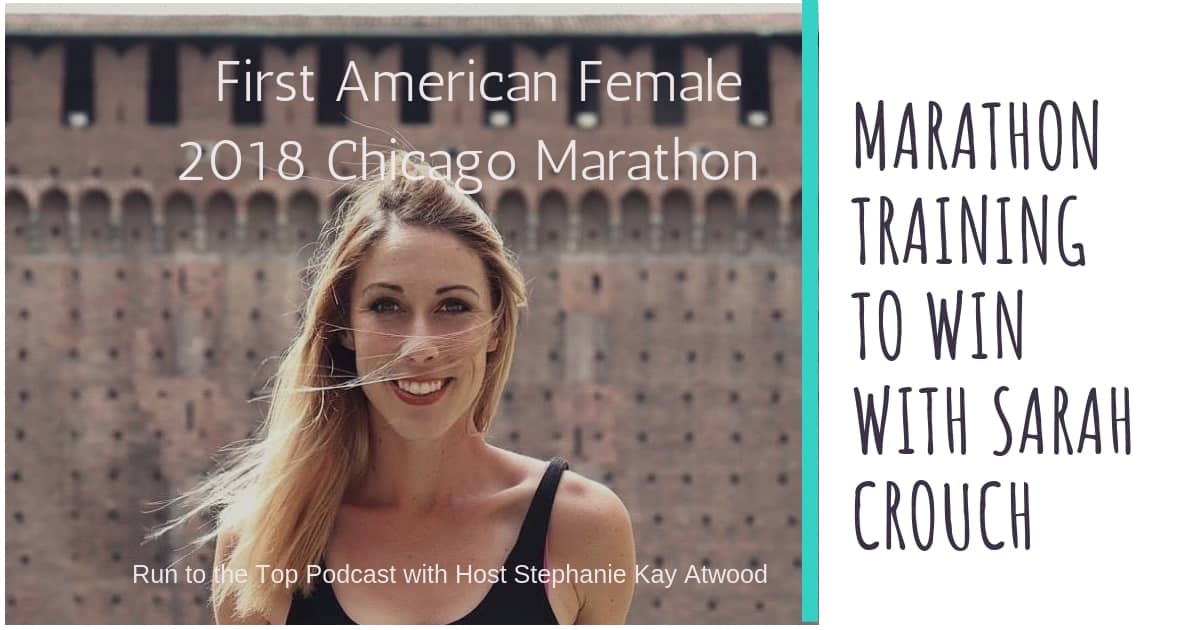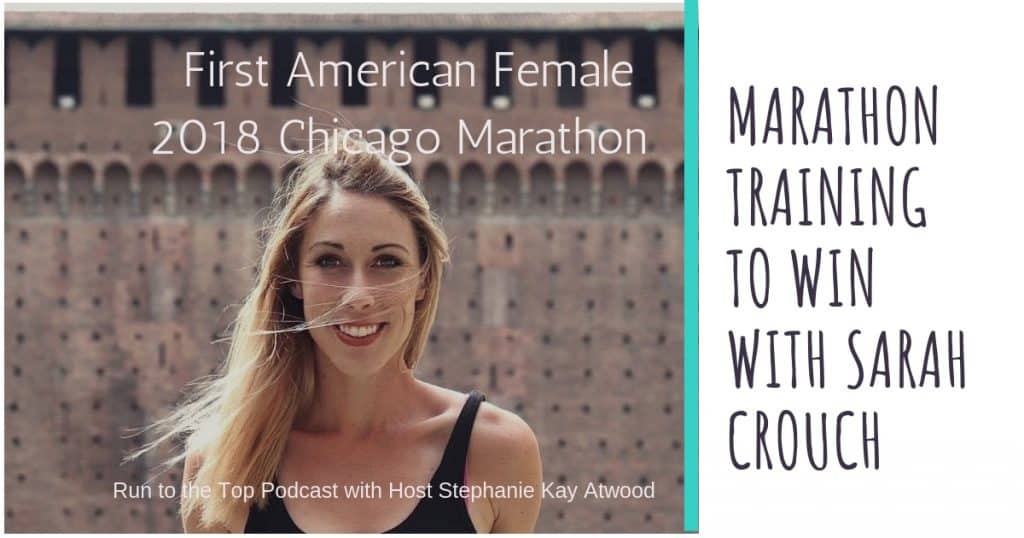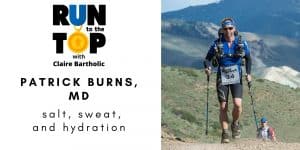Sarah Crouch – Marathon Training To Win
Earlier this month, Sarah Crouch was the first American female finisher at the Chicago Marathon with a time of 2:32:37, which was also a PR, and 6th place overall. Not bad for someone who wasn’t even talked about going into the race. Sarah is also a 4-time Olympic Marathon Qualifier with her eyes on the 2020 trials.
On this episode, Sarah discusses training strategies, nutrition and what it’s like being a pro runner: specifically the challenges and complexity of the compensation structure. She also shares her perspective on the unique challenges women have when training for Olympic trials.
Shorter distance training & over distance consideration
She also goes into detail on the importance of both shorter-distance racing and over-distance training; two opposite strategies that she feels provide an advantage for marathon performance. And we learn how crucial easy running and recovery is for achieving your best.
And if all that wasn’t keeping Sarah busy enough, she doesn’t just have a coach, she also IS a coach, working with about 30 athletes. Enjoy this conversation with elite runner and Olympic hopeful, Sarah Crouch.
Questions Sarah is asked:
2:00 First Four:
- How old are you?
- Where were you born?
- Where do you live now?
- What is your favorite race distance or type of race?
3:07 How does it feel to be the top American woman finishing at Chicago?
4:59 Were you overlooked as a contender going in?
5:56 Have conditions this year given underdogs an advantage?
7:15 What does it take to get into the Olympic trials and then to actually make the team?
9:19 How do you balance the goal of making the Olympic team with more ‘realistic’ goals?
12:19 How many weeks before Chicago did you start ramping up and what do you think would work well for journeyman recreational marathoners?
14:05 Are you totally inactive during 10-14 day rest periods during training?
15:16 What does your mileage look like at the beginning of your ramp-up cycle?
16:33 Do you just pick a couple trees as Fartlek markers?
17:06 What does your mileage and training look like around weeks 6 and 7?
18:25 How important is speed work and short-distance racing during training?
19:15 What are you doing for nutrition during peak training?
20:48 What about electrolytes?
22:40 (Asked by Sarah to Stephanie) How conducive is your local diet in Mexico to running?
24:54 How do you avoid injury?
26:26 How do you approach ‘over-distance’ training with you and the athletes you coach?
28:37 When you’re running a serious race like Chicago, are you giving 100% because you’re holding back for something else or are you giving 105%?
30:55 Are you doing California International Marathon (CIM) in December?
32:08 When would you start training for CIM?
33:43 What is the altitude where you live and train in Flagstaff, Arizona?
36:01 How does a professional athlete actually make a living by running?
38:40 What does your hourly rate work out with the various compensation structures?
40:48 Why do you seem to be less prone to injury?
42:02 Did you get your half-marathon PR while running with your sister?
43:54 How was your half-marathon PR race and how is the half different from the full?
45:55 Any other major races on the calendar?
47:11 What sacrifices have you made in your life for running?
50:25 Final Kick Round:
- What is your favorite local training run (location, starting point, parking, distance, terrain and safety issues)?
- Favorite running book(s)?
- Words of Wisdom or Humor?
- Who or what would you like to have featured on the Run To The Top podcast?
Quotes by Sarah:
“When I’m training for a marathon, my coach likes to include really big chunks at marathon pace during my long runs.”
“While I am certainly not faster than some of those other women, I do believe that I’m tougher than some of the other competitors I race.”
“A lot of really good women would have to have a bad day at the Olympic trials for me to make the team, but I don’t want to give up before I even hit the starting line because that’s certainly the goal for anyone in my position who is a professional runner, who makes a living on their legs.”
“We often see rest as the absence of training when the truth is rest is a PART of training.”
“If you’re in this sport for the money, you’re in the wrong sport.”
Take a Listen on Your Next Run
Want more awesome interviews and advice?
Subscribe to our iTunes channel
Mentioned in this podcast:
Run To The Top Winners Circle Facebook Community
NBC Chicago – Sarah Crouch, Elite Runner media guide
Sarah’s Chicago Marathon post-race interview
Urban Trail System Flagstaff – Fisher Point
Book: How Bad Do You Want It? by Matt Fitzgerald
When the Course Wins: No Finishers at the 2018 Barkley Marathons
Follow Sarah on:
We really hope you’ve enjoyed this episode of Run to the Top.
The best way you can show your support of the show is to share this podcast with your family and friends and share it on your Facebook, Twitter, or any other social media channel you use.
If more people who know about the podcast and download the episodes, it means I can reach out to and get through to the top running influencers, to bring them on and share their advice, which hopefully makes the show even more enjoyable for you!
—
Thank you to our sponsors for supporting Run to the Top
For 25% off your first month of personalized Care/of vitamins, visit TakeCareOf.com and enter
RTTT









